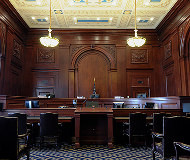11/24/2015
Federal Appeals Court Tosses Anti-Camera SuitSecond Circuit US Court of Appeals rejects civil rights lawsuit against Nassau County, New York camera vendor.

New York motorist Claire F. Leder last week received bad news in her challenge of a red light camera ticket. The Second Circuit US Court of Appeals refused to allow her to sue American Traffic Solutions (ATS) for taking away her constitutional rights.
The three-judge panel sidestepped the fundamental question of whether the yellow signal times at Nassau County intersections were too short, forcing people to trip the red light cameras to generate $50 citations. The three-judge panel decided that this penalty was too insignificant to worry about constitutional implications.
"We need not decide that issue here because, in any event, the alleged deprivation was not sufficiently arbitrary or outrageous to offend substantive due process," the court's summary order explained. "Because Leder's claim of shorter yellow-light time than provided by state law does not assert conduct so arbitrary, conscience-shocking, or oppressive as to implicate substantive due process, the district court correctly dismissed her claim."
In January, US District Judge Arthur D. Spatt sided with ATS because Leder failed to provide any official reports or measurements proving Nassau County's yellow times fell below the three-second minimum. Both the lower and appellate courts found it inappropriate to sue under a Civil Rights Act provision allowing lawsuits against police who misuse their authority.
"We have thus far limited application of that doctrine to claims against law enforcement officers who enhanced or created the opportunity for the criminal act through some interaction or relationship with the wrongdoer," the appellate order stated. "In Lombardi, we declined to extend the doctrine to officials who make discretionary policy decisions while subject to the pull of competing obligations. Leder's claim falls into this second category. She does not challenge defendants' overall authority to establish traffic light times or to use traffic cameras to identify violations and issue fines. She argues only that the challenged yellow-light time was at odds with state law. This does not state a claim for violation of substantive due process."
The summary order, which holds no precedential value, does not prevent Leder from raising the issues in a New York state courtroom. A copy of the appellate court's order is available in a 20k PDF file at the source link below.


